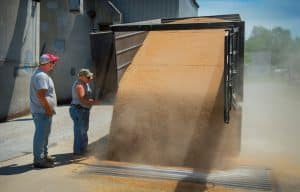Trade war hurting county farmers

Since last summer, the United States and China have been engaged in a trade war, the effects of which can be seen in Monroe County.
Since last summer, the United States and China have been engaged in a trade war, the effects of which can be seen in Monroe County.
Perhaps the clearest impact is with soybean, corn and pork markets, which have all taken a hit from the trade war.
“It’s huge,” Waterloo farmer Nathan Brinkmann said of the impact of the trade war. “When you’re selling beans for $10, usually, and you lose a dollar, that’s 10 percent right off the top. You throw in a weather event or some other kind of problem and that number can increase drastically. It’s a huge variable in a world of endless variables.”
Another Waterloo farmer, Ken Hartman Jr., put it even more succinctly.
“The problem is you can basically say that where the prices are today, they’re under the cost of production,” he said.
President Donald Trump started the trade battle with the goals of improving conditions for American companies in China, reducing the trade deficit with China and levelling the playing field for American businesses competing with Chinese ones.
Under Trump, the U.S. has imposed hundreds of billions of dollars worth of tariffs on Chinese goods, with Trump planning to raise tariffs on some products again in October.
China, in turn, has imposed over $100 billion of tariffs on U.S. goods.
Tariffs are a tax on imports or exports between sovereign states meant to encourage or protect domestic business.
Additionally, the American Farm Bureau Federation reported U.S. agricultural exports to China fell more than 50 percent last year as the Asian nation decreased its consumption of American agricultural goods.
That is where Monroe County farmers come in, as the trade dispute has impacted how they do business.
“The trade war has affected soybeans immensely because China is our No. 1 purchaser of soybeans,” Hartman said.
Hartman said the market for soybeans has dropped more than a dollar during the trade war.
That comes during a particularly difficult time for local farmers, as agweb.com reported that Illinois’ corn and soybean production is falling 11 and 25 percent, respectively, under last year’s estimate.
Moreover, the Trump administration is also working to ratify the United States-Mexico-Canada Agreement, which replaces a previous trade deal between the North American countries.
Hartman said Mexico is the top buyer of U.S. corn, so it is important to keep that country happy so it maintains or increases its corn purchases.
He said countries like Brazil and Argentina have moved to fill gaps created by the trade war, which can worry some farmers.
“Once you lose a market, it’s hard to get it back,” Hartman noted.
All that has led to organizations like the American Farm Bureau Federation, Illinois Soybean Association and Illinois Corn Growers Association to speak against the trade war.
Nevertheless, Trump has taken steps to help farmers, sending approximately $28 billion in aid and negotiating with Japan to try to get that country to up its corn purchases.
Hartman said those measures help, but they do not solve all farmers’ problems.
He said the aid, for example, is not sustainable.
“It helps you out for the short-term, but long-term it’s not helping you out,” he said. “We want to sell our grain. We want markets. We don’t want to live off the subsidies of the government.”
As far as negotiations with Japan go, Hartman said farmers are hopeful Trump can get something done – though that hope is tempered by recent experience.
“Most people feel if we can’t get USMCA passed and we can’t get China to work with us on some of these trade war situations, it’s going to be hard to get Japan to work with us,” Hartman explained.
In the meantime, farmers are taking steps to minimize any losses from the trade war.
One main way they are doing that, according to Hartman, is by not investing in new equipment or top-end products like seed, chemicals and fertilizer.
“When you have these situations, farmers are just not going to spend any money,” Hartman said. “They’re going to get by with what they can get by with.”
Brinkmann, who has a smaller farm of mostly soybeans near Prairie du Rocher, said he has taken that step.
He has also gotten another job.
“I’m driving a truck over the road to alleviate some of those pressures,” he said. “Farming wasn’t spectacular for me before the trade war. That was just the icing on the cake for me.”
Experts are uncertain when the trade war will end, so farmers will continue those practices.
Brinkmann said they will also look to get creative in their thinking, such as by planting non-genetically modified crops to tap into a different market.






